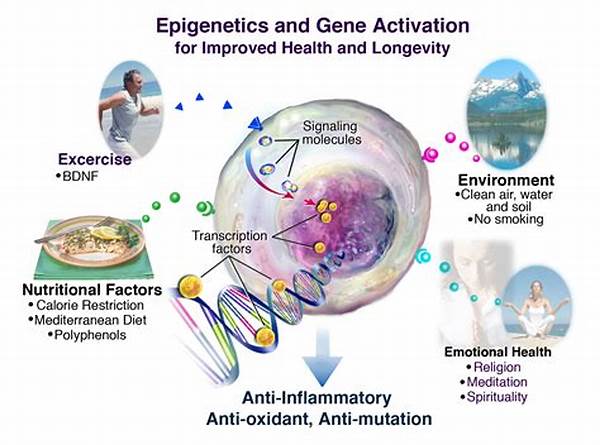
Epigenetic Influences On Addiction
- Daniel Anderson
- 0
- Posted on
Understanding the complexity behind addiction isn’t just about chemical dependencies or genetic predispositions. There’s a whole layer of complexity involving environmental factors and how they interact with our genes over time. This is where the concept of epigenetic influences on addiction comes into play. Epigenetics refers to changes in gene expression that don’t involve alterations to the underlying DNA sequence. It’s like having the same piano but playing different melodies by altering the way it’s played. These changes can be dynamic and influenced by various factors, including diet, stress, and exposure to addictive substances. Understanding these influences not only deepens our comprehension of addiction but also opens doors to more personalized and effective interventions.
Read Now : Mindfulness Exercises To Find Calm
The Science Behind Epigenetic Modifications
Epigenetic influences on addiction highlight how our environment impacts gene expression related to addiction. Picture this: your DNA is like a playlist, and what you expose yourself to can hit the shuffle button, playing tracks you never knew you had. So when someone says addiction runs in the family, it might be because those same environmental triggers have been hitting shuffle across generations. These transformations in gene expression, due to factors like stress or exposure to drugs, play a critical role in whether or not a person develops an addiction. It’s not just about having a genetic propensity; it’s about what happens to those genes under the influence of life’s various conditions. Understanding this can lead to strategies that prevent or reverse these changes.
How Epigenetic Influences Shape Addiction
Here’s the scoop on how epigenetic influences on addiction go down:
1. Stressing Overload: Stress can totally mess with your DNA playlist, unlocking tracks that might lead to addiction.
2. Nourishment Matters: A healthy diet can keep negative epigenetic influences at bay, while junk food might do the opposite.
3. Drug Exposure: Substances can tweak gene expression, getting you hooked by amplifying those feel-good tunes.
4. Social Environment: Peer pressure or social settings can play with your epigenetic settings, leading to susceptibility or resistance.
5. Exercise Effect: Regular exercise can be the DJ of your genes, playing tunes that fend off addiction.
Read Now : Cultivating Positivity Post-separation
Unpacking the Epigenetic Angle
Epigenetic influences on addiction unravel an intricate mix of lifestyle and genetic interactions. Imagine each gene having a dimmer switch. Factors like diet, stress, or drug use can turn some genes up while dimming others down. Ever notice how some people seem to slide down the slippery slope of addiction faster than others? That could be epigenetic influences at play. You’ll find that a person’s journey with addiction isn’t just a roll of the genetic dice. It’s also about how life’s myriad factors flip those epigenetic switches, pushing someone toward or away from addiction. That’s why interventions now consider both genetic predispositions and the environmental factors that lead to these epigenetic changes.
Epigenetic Shifts: The Inside Story
Exploring epigenetic influences on addiction offers insights into the biological adjustments that sway our vulnerability to addiction. Your DNA is like a script, but epigenetics is the director making real-time changes on set. Suppose addictive substances are directors yelling, “Cut!” and “Action!” their impact heavily influences which scenes, or genes, get more screentime. With these shifts, understanding how to intervene becomes crucial. Think of this as a play where the same script can lead to different performances depending on the director’s choices. With epigenetic knowledge, those dealing with addiction can recognize when and how to stage effective interventions, moving from awareness to actionable change.
The Complexity Beyond Genetics
When talking about epigenetic influences on addiction, we’re unearthing a layered story. It’s not just about having “bad genes.” It’s about how those genes interact with our life’s playlist. Simply put, it’s the difference between owning a pair of sneakers and knowing how to use them to run a marathon. Environmental cues, like social settings or early stress, tie into our genetic framework, leading to an intricate dance of expressions. These interactions mean that even if you have a genetic predisposition, your life choices and circumstances can deter or precipitate addiction. It’s not destiny; it’s a dance with dynamic moves, not just the occasional cha-cha but also unpredictable twists and turns.
Charting a New Course
Epigenetic influences on addiction underscore the importance of looking beyond static genetics to understand dynamic processes. Imagine sailing—it’s not just about the boat but how you navigate the waters. By acknowledging the role of these epigenetic changes, individuals can chart new courses and choose environments that may mitigate or even reverse adverse pathways. Through tailored interventions that address both epigenetic changes and them, the susceptibility to addiction can be significantly altered, changing the narrative from predestined paths to adaptable journeys. This understanding transforms obstacles into opportunities, offering hope and strategies for recovery.
Navigating the Future
In a world increasingly focused on personalized medicine, recognizing epigenetic influences on addiction opens doors to tailored approaches. By understanding how environmental influences, whether stress or diet, shape genetic expressions, we’re paving the way for interventions as unique as you are. This personalized approach goes beyond blanket treatments, diving into individual narratives and adjusting the components of care that resonate best with each person’s genetic and epigenetic makeup. It’s like crafting a mixtape specifically for someone’s unique vibe, where each track is meant to guide them toward healing and away from the cycles of addiction, paving new paths for future generations.